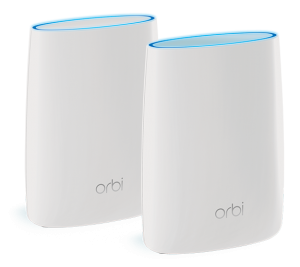Articles
Netgear releases two (slightly) cheaper Orbi routers | Engadget
Netgear announces two new Orbi routers | TechCrunch
From the horse’s mouth
NETGEAR
Orbi Wi-Fi System
My Comments
Most of the recently-issued distributed-wireless systems that consist of modules that extend Wi-Fi coverage across a larger area are typically architected for a large suburban home. But you may want to get the coverage right for a smaller or larger area such as a New-York-style apartment or a larger country house.
NETGEAR have revised their Orbi distributed-wireless system which is based on a “router + extender” setup. This consists of a three-band router serving as a hub device while the satellite devices work in a similar vein to the range extender although there is a separate waveband implemented for backhaul purposes as well as providing for a simplified setup and roaming routine. In this system, one of the bands is kept as a backhaul between the extender devices and the router.
But they have released a few more “right-sized” output extenders for the Orbi distributed-wireless system. The original system, known as the RBK50, was capable of working an AC3000 network with a 5000 square-foot coverage. On the other hand, the RBK40 works an AC2200 network capable of covering 4000 square feet of space. There is a third system, known as the RBK30 which uses a satellite unite that plugs directly in to the power outlet like most range extenders or HomePlug devices. This also uses AC2200 network technology and can cover 3500 square feet.
For example, I would recommend for a small single-storey house or apartment the RBK30 if you are answering the typical setup where your router is located at the front or back of the house. Here, you are nudging the coverage out to an area that is not fully covered because of the equipment being up the front. The RBK40 or RBK50 could answer needs like multi-storey or split-level houses, or larger single-storey houses. In this situation, you want to, for example, make sure that there is equal Wi-Fi coverage upstairs and downstairs or, again, “nudge” the coverage out towards the back of your house.
NETGEAR are also selling these repeaters as accessories rather than as part of an Orbi system. This is important for those of you who are wanting to provide infill coverage for an existing Orbi system such as to deal with a larger house.
The NETGEAR Orbi and its peers would work well for buildings where the interior walls aren’t constructed of highly-dense building materials. You would run in to problems with, for example, the brick or sandstone home where you built on an extension, or one of the English cottages where there was an emphasis on brick or masonry construction for the inside walls. The reason I am calling this out is because the Orbi system implements a dedicated 5GHz band for the backhaul while your network devices connect to the router or extender devices using another 5GHz and 2.4GHz band created for the network.
Personally, I would like to see the NETGEAR Orbi systems available as a variant that uses a HomePlug AV500 or HomePlug AV2 powerline backbone or can exploit an Ethernet backbone as an alternative to the wireless backbone for those environments where that backbone can’t cut it.
A question that needs to be raised in the use cases that NETGEAR demonstrates in their online marketing collateral is whether an Orbi Satellite extender can be “daisy-chained” to an extant Orbi Satellite extender. This may be of concern to those of us who decide we want to extend the Orbi System from the extender such as to “push out” the range further.
What I like about the latest NETGEAR Orbi additions is that NETGEAR are “right-sizing” this distributed-wireless system to suit different coverage areas like apartments, small homes and larger homes as well as providing a way to “fill-in” coverage dark spots.
New firmware available for original Orbi system (1.8.0.6)

